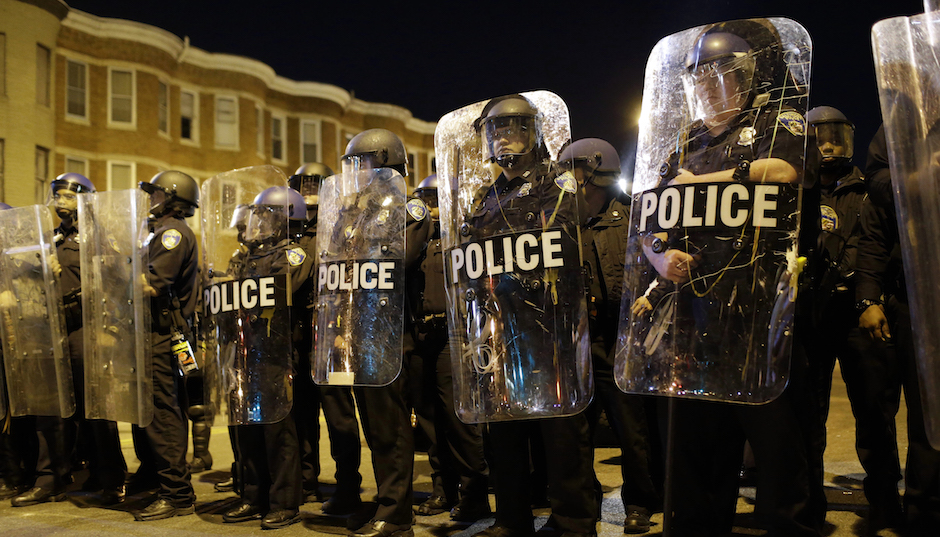The Brief: “We’re Sitting on a Powder Keg”

Police stand in formation as a curfew approaches, Tuesday, April 28, 2015, in Baltimore, a day after unrest that occurred following Freddie Gray’s funeral. (AP Photo/Patrick Semansky)
1. Baltimore, like Philadelphia, is largely led by black elected officials. Why was that not enough to prevent the protests and rioting?
The Gist: Writes Adam Serwer for Buzzfeed:
Monday’s riots in Charm City mark the end of an era where black outrage can be mollified by greater representation while stark inequalities persist. Today Baltimore has a black mayor, black police commissioner, and a police force evenly divided between black and white officers. Baltimore is no Ferguson, Missouri, a majority black city where black residents were inexplicably shut out of the city government, business elite, and police force. Instead of a beacon of hope, black representation has become a bitterly ironic symbol of how little has changed.
Philadelphia is much the same. Black Philadelphians are in the big chairs in the mayor’s office, the council president’s office, the district attorney’s office, the police commissioner’s office and the school superintendent’s office.
Why It Matters: But as in Baltimore, that representation hasn’t done a thing to equalize poverty or incarceration rates in the city. And so a lot of those black leaders are on tenterhooks. On Tuesday, mayoral candidate and State Senator Anthony H. Williams told the Inquirer that “we are sitting on a powder keg.” In the same article, District Attorney Seth Williams was quoted saying, “at any given time, anything could happen. That’s why we work so hard all the time to improve relations.”
How all of this tension will shape is hard to predict. The focus on police and community relations would seem, at minimum, to create additional problems for Lynne Abraham, whose law firm in the past has represented police officers accused of misconduct. But the dynamic is really a wild card. The candidates have to demonstrate that they understand and empathize with the rage that has fueled events in Baltimore, while at the same time carefully not condoning it. Can the candidates walk that tightrope, and use the moment to actually have a meaningful conversation about the disparities fueling the violence, which are as real in Philadelphia as they are in Baltimore?
2. City Paper goes deep on the case of police officer Christopher Hulmes, charged last week with perjury and other offenses.
The Gist: In 2011, Hulmes acknowledged in open court that he had given false testimony in a narcotics case — he did so, he said, in order to protect a confidential source. In spite of that admission, Daniel Denvir reports, “Hulmes continued to patrol the city’s bustling drug markets and to testify in criminal trials that likely sent many defendants to prison. Some of those convictions could end up being overturned and costing the city in civil settlements.” Denvir first reported on Hulmes’s case last August. This week, he explores how Hulmes stayed on the force and out on the street for so long after that admission in court.
Why It Matters: As Denvir writes, “the charges filed against Officer Hulmes are only the most recent scandal to emerge from Philadelphia’s Wild West drug war. Currently, six other narcotics officers are standing trial in federal court, accused of stealing hundreds of thousands of dollars from suspected drug dealers and brutally abusing them.” Second, Denvir’s reporting on this has been a terrific example of accountability reporting, which is one example of why it’s a shame that he’s moving on from City Paper and won’t be covering Philadelphia as closely as he has in the past.
3. The City Commissioner candidates get a rare public vetting.
The Gist: Five of six Democratic candidates and incumbent Republican Al Schmidt showed up Tuesday evening for a City Commissioner forum sponsored by the Committee of Seventy. It’s the only scheduled forum of the election for this important, but badly overlooked office (the Commissioners run elections in Philadelphia).
Why It Matters: City Commissioner Stephanie Singer failed to qualify for the ballot, meaning at least one new Commissioner will be elected on May 19 by voters who probably won’t know all that much about the candidates. It’s not inconceivable that two new commissioners could be elected: board chairman and incumbent Anthony Clark was pilloried at the forum for his record of not actually voting in the elections he’s charged with running (Clark did not show at the forum, either). Schmidt is unopposed.